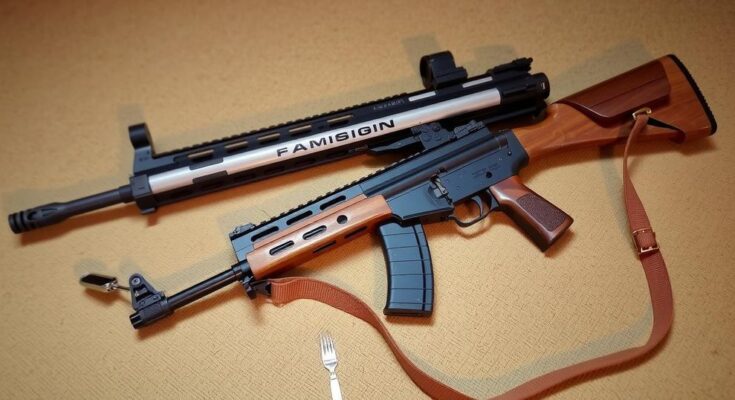Emirati weapons were reportedly discovered in a warehouse in Wad Madani, Sudan, after the Sudanese military reclaimed the city from the RSF. This follows a year of control by the RSF amid a civil war that has displaced millions and resulted in severe humanitarian crises. The UAE faces allegations of military support, causing scrutiny over its involvement in the conflict.
Recent reports have surfaced highlighting the discovery of Emirati-made weapons in Wad Madani, Sudan, following the Sudanese military’s capture of the city from the Rapid Support Forces (RSF). Videos depict military personnel exploring a warehouse stocked with large boxes containing ammunition and missiles, purportedly traced back to the United Arab Emirates (UAE). Attempts to obtain a comment from the UAE Embassy in Washington remained unanswered.
The Sudanese military, in collaboration with allied factions, regained control of Wad Madani after it had been under RSF domination for approximately one year. RSF leader Mohamed Hamdan Dagalo, commonly referred to as Hemedti, acknowledged his forces’ loss but expressed intentions to reclaim the city, indicating the protraction of the ongoing civil conflict.
As the conflict rages between the Sudanese army and the RSF since April 2023, its consequences are dire, resulting in over 11 million displaced individuals, with more than eight million facing acute food insecurity, according to the International Organization for Migration. Recently, the U.S. government referred to the situation in Sudan as genocide, imposing sanctions on RSF leader Dagalo and his relatives due to their alleged involvement in severe human rights violations.
Both factions in the conflict are reportedly benefitting financially from smuggling essential goods, such as food and fuel. There are serious allegations against the UAE regarding its support for the RSF. Former reports indicated that multiple flights from the UAE have facilitated armament transfers into Sudan via a Chad airstrip. While Emirati officials have dismissed these allegations, stating their involvement includes humanitarian aid only, some U.S. officials view the UAE as a crucial supporter of the RSF’s operations.
This ongoing crisis underscores the complex entanglements of foreign military involvement and highlights the detrimental humanitarian implications stemming from the insurgent strife in Sudan.
The situation in Sudan has escalated into a severe civil conflict opposing the Sudanese army and the paramilitary RSF, leading to widespread humanitarian crises. Recent developments draw attention to the role of foreign nations, particularly the UAE, whose alleged military support for RSF has been contentious. The Sudanese military reclaimed strategic locations recently, intensifying the conflict and revealing the impacts of external arms supply. A significant humanitarian disaster is unfolding, with millions affected by displacement and food scarcity.
The emergence of Emirati weapons in Sudan’s Wad Madani highlights the critical implications of foreign military involvement in local conflicts. With the ongoing humanitarian crisis, marked by mass displacement and food insecurity, the international community faces pressing challenges in addressing and resolving the atrocities stemming from this civil war. The role of the UAE, particularly in supplying arms, raises ethical concerns about the influence of external support in exacerbating conflict.
Original Source: www.middleeasteye.net




